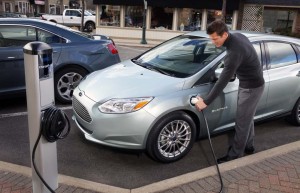
Ford has so far sold only 1,500 Focus Electric vehicles this year - less than 1% of total Focus sales.
With battery-car sales lagging expectations, automakers have been slashing prices in a bid to spur demand. The latest to announce a big discount is Ford Motor Co., which will trim the MSRP on its Focus Electric model by $6,000.
That’s on top of the $4,000 discount the Detroit maker took on the compact battery-electric vehicle a year ago. Originally introduced in January 2011 at $39,995, buyers now can plug in a Ford Focus Electric for just $29,995 – plus delivery charges and the usual fees and taxes.
Ford is by no means alone. With rare exception, automakers have been cutting prices of both plug-in and pure battery-electric vehicle, or BEV, models in a bid to boost sluggish sales. And with gas prices now near or below $3 a gallon in much of the U.S., industry analysts suggest it will be even more difficult to convince buyers to opt for vehicles that plug in rather than tank up.
The Focus Electric is nearly identical to the conventional Ford compact model but for its electric drivetrain and the various gauges and displays that allow a motorist to monitor their energy consumption. Among other things, EV owners need to keep a close tab on their range to make sure they can either get back home or find an available place to charge up.
With less than 100 miles of range, even in the most optimum of conditions, the lithium-ion powered Focus Electric generated only about 1,500 sales during the first nine months of this year, less than 1% of the 176,156 Focus models Ford sold in the U.S.
(Click Here to check out all the new battery-electric and other high-mileage offerings to debut at this year’s Paris Motor Show.)
The Focus Electric isn’t the only model struggling, however. Overall, plug-based vehicle sales totaled just 87,337 between January and September of this year, according to data compiled by InsideEVs.com. That’s barely 0.7% of the overall U.S. market.
On the positive side, total U.S. plug-based vehicle sales are already closing on the total for all of 2013, just 97,507. But there are also more electrified options on the market – a total of 22 different models at the moment, compared to just 16 at this time last year.
Some have been gaining a bit of momentum. By the end of October, the Nissan Leaf is likely to top the 23,094 copies it sold for all of 2013, making it the best-selling plug-based vehicle on the U.S. market. But Nissan has also cut prices several times to help give the little Leaf a boost in demand.
So has Chevrolet with its second-best-seller, the Volt plug-in hybrid, Honda with its Accord plug-in, Mitsubishi with its i-MiEV battery-electric vehicle, Smart, with its ElectricDrive BEV, and Fiat with its 500e. In fact, Fiat Chrysler CEO Sergio Marchionne has all but asked consumers not to buy the little electric vehicle because his company loses more than $10,000 on every one it sells.
Why keep selling plug-based vehicles, then? Ask California regulators who have enacted strict so-called Zero-Emissions Vehicle mandates that require any major manufacturer to bring such clean vehicles to market. Several makers are looking for other options. Hyundai launched sales of its new Tucson Fuel Cell Vehicle over the summer, and Honda and Toyota both plan to introduce hydrogen-powered vehicles of their own in 2015.
Significantly, Toyota plans to pull the plug on its little RAV4-EV shortly, leaving it with only one other lithium-powered model, the Prius Plug-In Hybrid. The Japanese giant has become an outspoken corporate skeptic when it comes to lithium technology, preferring to focus on conventional hybrids – such as the original Prius – using older and less powerful nickel-metal hydride batteries.
Despite Toyota’s reluctance, at least some manufacturers remain committed to electrification, and several appear to be gaining traction with their latest offerings. That includes BMW, with the new i3, an urban battery-electric vehicle, and the plug-in hybrid i8 sports car.
Slow to charge up on battery technology, Volkswagen AG is rapidly accelerating its efforts with models ranging from the new e-Golf to the upcoming Bentley SUV with its plug-in hybrid option.
(Audi readying a wave of new plug-in hybrids. Click Here for more details.)
Then there’s Tesla, which plans to roll out its second product line, the pure electric Model X SUV, next year. A third, more mainstream Model III is set to follow around 2016. Tesla is one of the rare makers not to discount its EV offerings, the current Model S running up to a fully-loaded $110,000. And a new high-performance all-wheel-drive version is expected to push that figures thousands of dollars higher.
(Why are investors suddenly unplugging from Tesla? Click Here to find out.)

It doesn’t take an economist to determine these EVs are impractical for 99% of consumers.
People who like antiques should love this car, since with a sub-100 mile range it’s outdated when it’s brand-new.